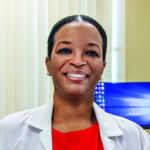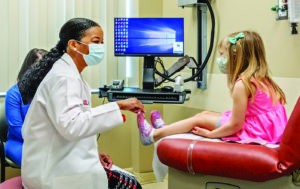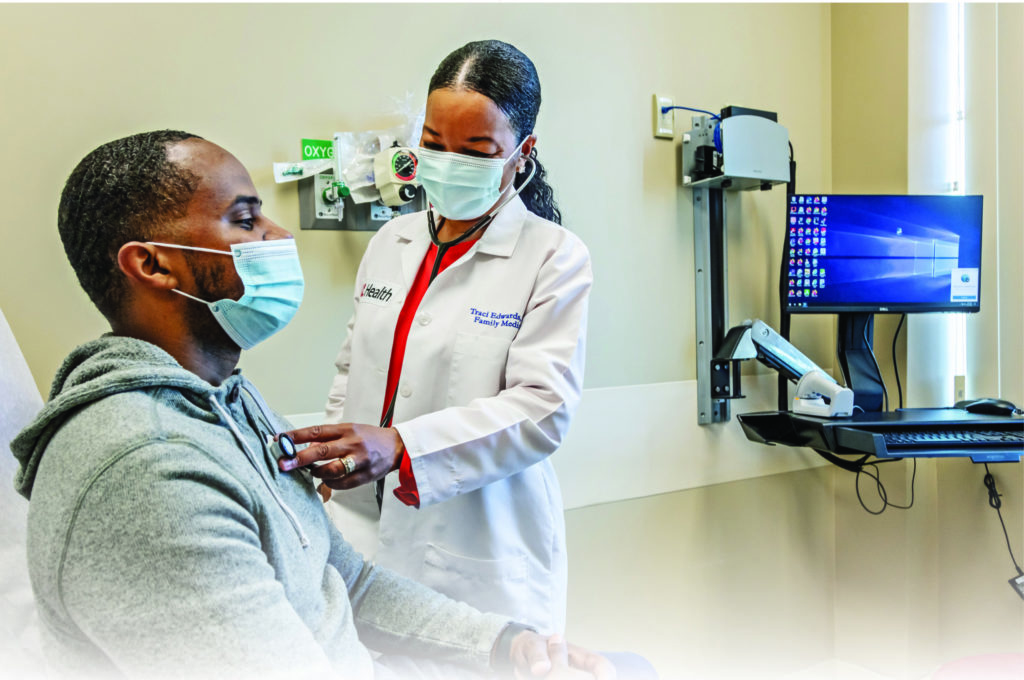
LOUISVILLE While it may be debated as to whether the “dream job” actually exists or is just a fantasy, Traci Edwards, MD, knows her job is pretty dreamy.
“I love what I do, and I never dread coming to work,” says Edwards, who is a family medicine physician at the UofL Health-Medical Center Southwest, just off the Dixie Highway. “I see new things every day, I dry tears every day, I see a lot of smiles every day, and it is such a rewarding career.”
Edwards grew up on Louisville’s West End before moving to the east side of town and attending Wagner High School. Following her undergraduate days at Western Kentucky University, she attended medical school at the University of Kentucky College of Medicine and then did her residency at St. Elizabeth’s Medical Center in Dayton, Ohio. She returned to her hometown in 1996, and set up shop as a family practitioner.
“I always wanted to go into medicine, from the time I was very small,” she says. “Once I was in medical school and did rotations in a variety of specialties, I liked family medicine because you get to see something different every day.”
Another sign that she was fated for family practice is the fact she and her husband’s first child was born during her final year of residency when she was serving as chief resident at St. Elizabeth’s.
“Having our first child wasn’t part of my family practice planning,” she notes with a laugh, “but a family medicine doctor I worked with did deliver our son! Since being around family was important, we ended up coming back to Kentucky.”
Family Practice Matters
 Clearly being in family medicine requires doctors to have a vast body of knowledge. One moment they may be treating a broken wrist or swollen feet and the next kidney failure or heart palpitations.
Clearly being in family medicine requires doctors to have a vast body of knowledge. One moment they may be treating a broken wrist or swollen feet and the next kidney failure or heart palpitations.
“I think the belief that your primary care doctor treats low-complexity cases is a big myth,” Edwards says. “We actually see a variety of problems—I will see heart failure, cancer—and we often make those major diagnoses. That initial work is often done by a primary care provider.”
In a time when specializing is common, she offers a reminder about one very important aspect of being a family practitioner.
“Specialty practices seem to be more attractive to grads coming out,” she says. “If you are going into medicine for the income, primary care isn’t at the top of the scale, but I think it is at the top of the rewards scale.”
Physician, Sociologist, and Friend
Family practice doctors must have a broad-based medical knowledge and be very flexible because of the nature of not knowing what is coming through the door each day, says Edwards.
The population around UofL Health-Medical Center Southwest is predominantly seniors and, as a result, Edwards’ patients have a range of conditions: diabetes, heart and lung disease, high blood pressure, obesity, and COPD.
In addition to working with those issues, Edwards recognizes other factors, such as finances, transportation, and culture, that can impact her clients’ treatment and care.
“I think, based on my background and coming from Louisville, I have more insight into the potential factors, often financial or cultural, that keep some people from getting healthcare,” she says. “I really try to get to understand them better as a person, which helps overcome some barriers.”
She cites rising medication costs and high deductibles as reasons why some patients won’t have certain procedures done. Another, more practical, problem is transportation, as many depend on a family member or friend to get them around.
“Some patients have trouble just getting in for an office visit,” says Edwards. “And, there are a lot of specialists who aren’t in the south end of Louisville, and when we make a referral to a provider on the other end of town, patients might say, ‘I can’t get there, you just need to figure it out,’ and we try to. But that impacts care.”
Making Impactful Lifestyle Choices
Dr. Edwards emphasizes the importance of lifestyle as a way to better health. Here are three of her thoughts on that topic:
“One lifestyle change I advocate to patients is rest. Rest is also important to your mental health, which has an impact on your physical health. You have to rest both your body and your mind.”
“With exercise, people may say they don’t have time. So, we have a conversation about how much time they spend on their cell phone or watching TV instead of going for a walk. Patients understand it in those terms.”
“When advocating for dietary changes, I need to be cognizant of what is available in their community. If they don’t have access to fresh fruits and vegetables, frozen fruits and vegetables are just fine, and that may fit what’s in the budget. I do stress fresh or frozen over canned for both.”
Adapting to—and Loving—Telehealth
Speaking of obstacles that impact care, COVID-19 was a big one. As the whole world came to a halt and there were restrictions, especially for the first few months, about in-person gatherings, doctors had to rethink the traditional office visit.
Enter telehealth. “Telehealth wasn’t something that was really on my radar or that I thought I’d be interested in,” Edwards says. “All of a sudden, we had to become very knowledgeable on it, and I have found that I like it a lot.”
Since some of her patients have difficulties getting in the office, telehealth provides a way for them to stay connected. Positive outcomes include flexibility to schedule a consult on short notice, staying connected to their healthcare provider more regularly, and the visual aspect—they are still “seeing” their doctor.
“They also seem to be more relaxed and comfortable at home; one even wanted to show me their garden!” quips Edwards.
While COVID isn’t over yet, physicians are seeing more patients in the office again. That is a good thing, but Edwards is quick to note that isn’t the only option for her moving forward.
“I do a mixture of telehealth and in-office visits, since there are still patients who don’t feel comfortable coming in and others who just can’t,” she says. “Through telehealth, we are more able to meet their needs, which is crucial. You may have to get a little crafty with telehealth, but it is obviously here to stay.”
In Partnership with Her Patients
Behind every good doctor is, well, a good patient. Edwards has worked with thousands of patients over the years, and the deep, long-standing relationships she’s developed have a positive impact regarding care.
“I believe that healthcare is a group project,” says Edwards. “I can’t be the only one worried about your diabetes; we both have to work on it, and you have to take some ownership of your care.”
One of her goals is to help fill what she calls “care gaps.” Good communication is key, from finding out if medications are working to making sure patients come in for follow-up visits and are doing what they need to in terms of preventative care.
“And now have a different platform to reach patients, telehealth, so we aren’t limited to just the office visit anymore,” she says. “We also have electronic health records, and we can get information so quickly and easily from other medical providers, which helps us make more informed decisions.”
Edwards has been a doctor long enough that she has seen multiple generations of families, a fact that she loves.
“I will have the grandparents, then the mother and father and their children, and then the grandchildren as patients,” she says. “It is very rewarding and very humbling, and I don’t take for granted that they choose to come to me. I like forming a bond with the people that I treat; they get to know me and I get to know them.”
And that simple fact makes Edwards’ job as a family practitioner pretty much her dream job.




